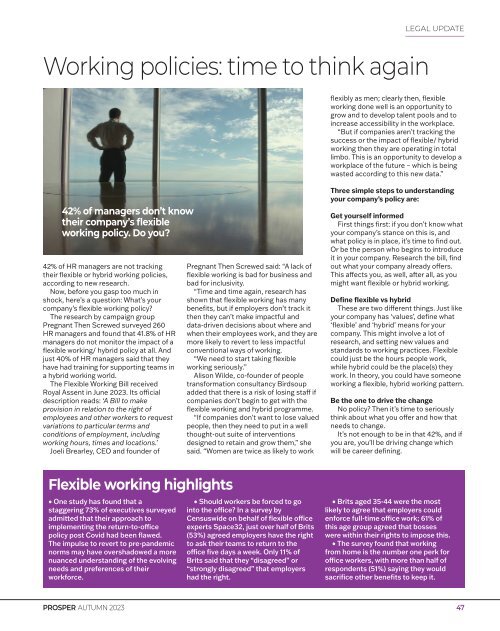Prosper Autumn 2023 Yumpu_compressed
Create successful ePaper yourself
Turn your PDF publications into a flip-book with our unique Google optimized e-Paper software.
LEGAL UPDATE<br />
Working policies: time to think again<br />
flexibly as men; clearly then, flexible<br />
working done well is an opportunity to<br />
grow and to develop talent pools and to<br />
increase accessibility in the workplace.<br />
“But if companies aren’t tracking the<br />
success or the impact of flexible/ hybrid<br />
working then they are operating in total<br />
limbo. This is an opportunity to develop a<br />
workplace of the future – which is being<br />
wasted according to this new data.”<br />
42% of managers don’t know<br />
their company’s flexible<br />
working policy. Do you?<br />
42% of HR managers are not tracking<br />
their flexible or hybrid working policies,<br />
according to new research.<br />
Now, before you gasp too much in<br />
shock, here’s a question: What’s your<br />
company’s flexible working policy?<br />
The research by campaign group<br />
Pregnant Then Screwed surveyed 260<br />
HR managers and found that 41.8% of HR<br />
managers do not monitor the impact of a<br />
flexible working/ hybrid policy at all. And<br />
just 40% of HR managers said that they<br />
have had training for supporting teams in<br />
a hybrid working world.<br />
The Flexible Working Bill received<br />
Royal Assent in June <strong>2023</strong>. Its official<br />
description reads: ‘A Bill to make<br />
provision in relation to the right of<br />
employees and other workers to request<br />
variations to particular terms and<br />
conditions of employment, including<br />
working hours, times and locations.’<br />
Joeli Brearley, CEO and founder of<br />
Pregnant Then Screwed said: “A lack of<br />
flexible working is bad for business and<br />
bad for inclusivity.<br />
“Time and time again, research has<br />
shown that flexible working has many<br />
benefits, but if employers don’t track it<br />
then they can’t make impactful and<br />
data-driven decisions about where and<br />
when their employees work, and they are<br />
more likely to revert to less impactful<br />
conventional ways of working.<br />
“We need to start taking flexible<br />
working seriously.’’<br />
Alison Wilde, co-founder of people<br />
transformation consultancy Birdsoup<br />
added that there is a risk of losing staff if<br />
companies don’t begin to get with the<br />
flexible working and hybrid programme.<br />
“If companies don’t want to lose valued<br />
people, then they need to put in a well<br />
thought-out suite of interventions<br />
designed to retain and grow them,” she<br />
said. “Women are twice as likely to work<br />
Three simple steps to understanding<br />
your company’s policy are:<br />
Get yourself informed<br />
First things first: if you don’t know what<br />
your company’s stance on this is, and<br />
what policy is in place, it’s time to find out.<br />
Or be the person who begins to introduce<br />
it in your company. Research the bill, find<br />
out what your company already offers.<br />
This affects you, as well, after all, as you<br />
might want flexible or hybrid working.<br />
Define flexible vs hybrid<br />
These are two different things. Just like<br />
your company has ‘values’, define what<br />
‘flexible’ and ‘hybrid’ means for your<br />
company. This might involve a lot of<br />
research, and setting new values and<br />
standards to working practices. Flexible<br />
could just be the hours people work,<br />
while hybrid could be the place(s) they<br />
work. In theory, you could have someone<br />
working a flexible, hybrid working pattern.<br />
Be the one to drive the change<br />
No policy? Then it’s time to seriously<br />
think about what you offer and how that<br />
needs to change.<br />
It’s not enough to be in that 42%, and if<br />
you are, you’ll be driving change which<br />
will be career defining.<br />
Flexible working highlights<br />
• One study has found that a<br />
staggering 73% of executives surveyed<br />
admitted that their approach to<br />
implementing the return-to-office<br />
policy post Covid had been flawed.<br />
The impulse to revert to pre-pandemic<br />
norms may have overshadowed a more<br />
nuanced understanding of the evolving<br />
needs and preferences of their<br />
workforce.<br />
• Should workers be forced to go<br />
into the office? In a survey by<br />
Censuswide on behalf of flexible office<br />
experts Space32, just over half of Brits<br />
(53%) agreed employers have the right<br />
to ask their teams to return to the<br />
office five days a week. Only 11% of<br />
Brits said that they “disagreed” or<br />
“strongly disagreed” that employers<br />
had the right.<br />
• Brits aged 35-44 were the most<br />
likely to agree that employers could<br />
enforce full-time office work; 61% of<br />
this age group agreed that bosses<br />
were within their rights to impose this.<br />
• The survey found that working<br />
from home is the number one perk for<br />
office workers, with more than half of<br />
respondents (51%) saying they would<br />
sacrifice other benefits to keep it.<br />
PROSPER AUTUMN <strong>2023</strong> 47
















